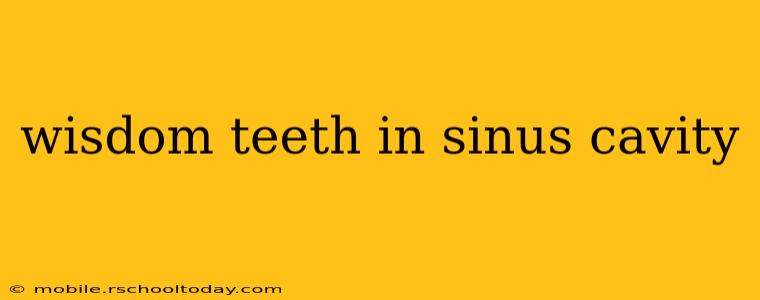Wisdom teeth, also known as third molars, are the last teeth to erupt in the mouth, typically appearing between the ages of 17 and 25. While many people experience no issues with their wisdom teeth, their proximity to the maxillary sinuses (located above the upper molars) can lead to complications. This article explores the potential problems associated with wisdom teeth located near or in the sinus cavity, offering a comprehensive understanding of the risks and treatment options.
What Happens When Wisdom Teeth Are Close to or in the Sinus Cavity?
When wisdom teeth are positioned close to or even within the maxillary sinus, several complications can arise. The roots of the wisdom teeth may extend into the sinus cavity, creating a thin layer of bone between the tooth and the sinus. This close proximity increases the risk of infection and other issues.
How Can Wisdom Teeth Affect My Sinuses?
The most common problem is sinusitis. If the wisdom tooth becomes infected (pericoronitis), the infection can easily spread to the sinus cavity, causing pain, pressure, and inflammation. This can manifest as sinus headaches, nasal congestion, and a feeling of fullness in the face. Furthermore, the extraction process itself, particularly if the tooth root is embedded in the sinus, can create an opening between the mouth and sinus, increasing the risk of sinus infections.
Can Wisdom Teeth Cause Sinus Infections?
Yes, wisdom teeth can absolutely contribute to sinus infections. An infected wisdom tooth located near the sinus can easily spread bacteria, leading to acute or chronic sinusitis. The inflammation associated with impacted or partially erupted wisdom teeth can also put pressure on the sinus lining, exacerbating any existing sinus issues.
What Are the Symptoms of Wisdom Teeth Affecting the Sinuses?
The symptoms of sinus problems related to wisdom teeth can vary but often include:
- Facial pain and pressure: This is often felt in the upper jaw and cheekbone area.
- Headaches: Similar to sinus headaches, often accompanied by pressure and pain in the forehead and temples.
- Nasal congestion: Difficulty breathing through your nose.
- Postnasal drip: Excess mucus dripping down the back of your throat.
- Bad breath (halitosis): Due to the infection near the tooth.
- Fever: A sign of infection.
- Swelling in the face: Inflammation around the tooth and sinus area.
What Happens If You Don't Get Your Wisdom Teeth Removed?
Leaving impacted or problematic wisdom teeth untreated can lead to various complications, including recurrent sinusitis, cysts, tooth decay in adjacent teeth, and even jawbone damage. The potential for serious infection is also a significant concern. Early detection and treatment are vital in preventing long-term issues.
What are the Treatment Options for Wisdom Teeth Near the Sinus?
The recommended treatment typically involves surgical removal (extraction) of the wisdom teeth. However, the approach taken depends on the individual's specific situation, including the position of the teeth and the amount of bone separating the tooth from the sinus. A dentist or oral surgeon will assess the situation via X-rays and recommend the best course of action. In cases where the roots are very close to the sinus, the extraction might require specialized techniques to minimize the risk of sinus perforation.
What if a Hole is Created During Wisdom Teeth Removal?
If a hole (oroantral fistula) is accidentally created during wisdom tooth extraction near the sinus, your surgeon will likely use techniques to close the opening. This may involve stitches or allowing the area to heal naturally. You may be given antibiotics to prevent infection and advice on how to care for the area to promote healing. Following your surgeon's post-operative instructions is crucial for preventing complications.
This information is for educational purposes only and should not be considered medical advice. Always consult a dentist or oral surgeon for diagnosis and treatment of wisdom teeth issues, especially if you suspect they are impacting your sinuses. Early intervention is key to preventing potential complications and maintaining optimal oral and overall health.
